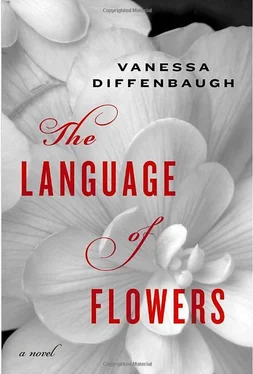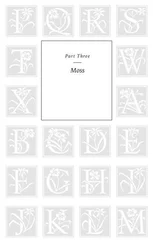Mark sat down next to her and patted her on the back with a fist. She laughed and hiccupped. “She’s trying not to cry,” he said. “If she cries this close to the wedding, it will definitely show in the photographs.”
Caroline laughed again, and a tear escaped. She swatted at it with a manicured fingernail and kissed Mark. “He doesn’t understand the significance,” she said. “He’s never met Alejandra and Luis, and doesn’t know about what happened on their honeymoon.”
I nodded as if I remembered this couple and the flowers I had chosen for them. “So, what can I do for you?” I asked as patiently as I could manage.
“You know that old question, if you could eat only five foods for the rest of your life, what would they be?” I nodded, even though no one had ever asked me that question. “Well, I keep thinking about that. Choosing flowers for a wedding is like picking the five qualities you want in a relationship for the rest of your life . How can you possibly choose?”
“She says for the rest of your life like marriage is a terminal disease,” said Mark.
“You know what I mean,” she said, examining her hands.
I was only half listening to their conversation, thinking about the five foods I would choose. Donuts, definitely. Did I have to specify a type, or could I just say assorted? Assorted, I decided, with an emphasis on maple.
Caroline and Mark were debating red roses and white tulips, love versus the declaration of love . “But if you love me and don’t tell me, how will I know?” she asked.
“Oh, you’ll know,” Mark said, raising his eyebrows and running his fingers from her knee to the top of her thigh.
I looked out the window. Donuts, roasted chicken, cheesecake, and butternut squash soup, extra hot. One more. It should be a fruit or a vegetable if I was to survive more than a year on this imaginary diet, but I couldn’t think of any I liked enough to eat every day. I drummed my fingers on the card table and looked out the window at the unseasonably blue sky.
And just then I knew exactly what it would be, and I knew I had to leave, right then, to see Elizabeth. The grapes were ripe. I’d been counting the warm fall days, twelve in a row, and just now, the sun shining in sharp, dust-filled angles through the dark room, I knew the grapes were ready for harvest. I also knew that Elizabeth had not yet discovered them. I don’t know how I knew this, but I did, in the way that I had heard some mothers and daughters, once connected by an umbilical cord, know before being told when the other was sick or in danger. I stood up. Caroline and Mark had moved on to heliotrope versus wild geranium, but I had missed who had won the tulip-rose debate.
“Why are you limiting yourself?” I asked, more harshly than I had intended. “I never told you to limit yourself to a certain number of flowers for your bouquet.”
“But who ever saw a bride carrying a bouquet with fifty different types of flowers?” she asked.
“So, start a trend,” I said. Caroline was the type who would like the possibility of starting a trend. I pulled out my spiral notebook and a pen. “Go through the boxes one card at a time and write down every single quality you want in your relationship. We’ll get together everything we can at the last minute,” I said. “But give up on matching your bridesmaids’ dresses.”
“The dresses are chartreuse,” Caroline said sheepishly, as if she had purchased them in anticipation of this exact moment. “They’ll match anything.”
I was already halfway up the stairs. I needed to call Marlena. She was capable of filling the order without me, and would do it quickly and professionally. Her arrangements were not beautiful—she had improved little over time—but she knew the flowers and definitions by heart and would not confuse oak-leaf with pencil-leaf geranium. The reputation of Message depended on the content of the bouquet, not on the artistic merit of the arrangements, and in the area of content Marlena was flawless.
She answered after one ring, and I knew she’d been awaiting this call, too.
“Come over,” I said. Marlena groaned. I hung up without telling her that I wouldn’t be here when she arrived, or that Caroline and Mark were in the midst of compiling quite possibly the most complex bouquet in the history of San Francisco weddings. No reason to alarm her.
I grabbed my keys and took the stairs two at a time.
“Marlena is on her way,” I said to Caroline and Mark as I walked past the table and out the door.
I drove the country roads as I had so many times before, with Grant, alone, and then with the baby, the last time I had come. Passing the flower farm, I pressed my palm into my left temple to block my peripheral vision. I didn’t see the farmhouse, the water tower, or the flowers. I had mustered up the courage to see Elizabeth but could not bear the thought of glimpsing Grant or my daughter on the same day.
Across from Elizabeth’s driveway, I pulled onto the shoulder of the road. A school bus passed, and then a crowded brown station wagon. When the road was empty, I stepped out into the quiet countryside and looked across the road.
On first glance, the vineyard was exactly how I remembered it. The long driveway, the farmhouse in the center, the vines running in stripes parallel to the road. I leaned back against my car, looking for signs of the damage I had caused. The vineyard had been replanted, the charred earth turned, and the ashes were long gone; even the thistle had returned to the ditch, as tall and dry as it had been the night I lit the fire. Only the thickness of the vines revealed the history of the blaze: On the southeastern quadrant of the property, the trunks of the grapevines were half as thick as those on the opposite side of the driveway. The leaves of the younger plants were a brighter shade of green, and noticeably more fruit hung on the vines. I wondered if the quality of the fruit on the new vines had yet reached Elizabeth’s standards.
I walked across the road. The house looked unchanged, but the row of sheds had disappeared—burned, I imagined, to the ground. Carlos’s trailer was gone, too, but I doubted the metal had melted; it was more likely he’d found another job or moved away, and Elizabeth had disposed of the trailer. Without the dilapidated outbuildings, the house looked more like a bed-and-breakfast than a working vineyard. The white paint was bright and spotless, and a pair of red wooden rocking chairs sat on the front porch. Inside the lace-covered window, the kitchen light was on.
Pausing on the bottom step, I heard a soft sound like a rush of wind, followed by a quiet splash. Elizabeth was in the garden. My back pressed against the white clapboard, I crept around the side of the house. Elizabeth squatted barefoot in the dirt just paces from where I stood, her back to me. Mud oozed into the wrinkles on the backs of her heels, and when she leaned forward, I saw that the arches of her feet were clean and pink.
“Again?” she asked, holding up a round wire ring with a worn wooden handle.
I moved away from the wall to get a better view of the garden. On a path in front of the roses sat a galvanized washbasin half-full of bubble solution, iridescent swirls reflecting in the thick liquid. With one hand squeezing the edge of the basin, a round-eyed baby reached for the metal ring. She sat on the ground in only a cloth diaper, and her naked body swayed, her full belly teetering on her unstable bottom. With her free hand, Elizabeth reached behind the baby’s back to steady her, and in the moment of distraction, the baby succeeded in grabbing the ring and pulling it, still soapy, into her mouth. She gummed it fiercely.
“Excuse me, little one,” Elizabeth said, tugging unsuccessfully on the wooden handle. “This is a bubble wand, not a teething ring.”
Читать дальше












